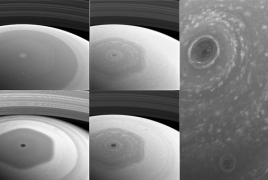Saturn's biggest moon has enough energy to run a colony July 10, 2017 - 16:23 AMT PanARMENIAN.Net - Saturn's biggest moon, Titan, is one of the few viable places humans can explore first-hand beyond Mars. It's relatively safe from radiation, it's covered in liquid (though not water) and otherwise relatively safe. But could more than a handful of people even stay there for very long? Apparently, the answer is yes, Engadget said. Researchers have conducted a study showing that Titan should have enough energy to sustain a colony. The first arrivals might have to build a nuclear power plant and take advantage of radioactive decay, but colonists could use the abundance of hydrocarbon lakes to generate power by combining hydrogen with acetylene (which should also be plentiful). And since Saturn creates strong tides, you could use turbines to generate plenty of electricity. Some generation methods would be more realistic than others. Wind power would only be truly effective in the upper atmosphere (albeit 10 times more effective than on Earth) and would require tethered turbines. Solar energy, meanwhile, would be the most daunting. Titan barely gets any sunlight, so you'd need a tremendous number of solar panels. A population roughly that of the US, about 300 million, would require enough panels that you could cover the US. Solar would clearly be more of an energy supplement than a primary source, then. Spaceship crews would love Titan, though, as the surplus of methane could turn the moon into a giant fuel depot. A separate study notes that Titan's lakes are calm enough that you could land probes without too much trouble, clearing a path for human visitors. There's no question that any landing on Titan is decades away and would still be fraught with challenges, such as the extreme cold (-291F), low gravity (0.14 g) and inhospitable atmosphere. Manned trips to Mars aren't expected to happen until the 2030s, and that planet is both closer and much, much warmer. Nevertheless, the findings could be helpful in the long run. Humanity has very few choices for visiting moons and planets that are even vaguely survivable. If the species is going to maintain any kind of significant footprint beyond Earth, it needs to know what its options are well before it starts building ships and habitats. Authorities said a total of 192 Azerbaijani troops were killed and 511 were wounded during Azerbaijan’s offensive. In 2023, the Azerbaijani government will increase the country’s defense budget by more than 1.1 billion manats ($650 million). The bill, published on Monday, is designed to "eliminate the shortcomings of an unreasonably broad interpretation of the key concept of "compatriot". The earthquake caused a temporary blackout, damaged many buildings and closed a number of rural roads. Partner news |